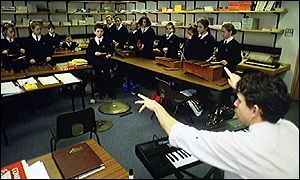
Genetic clues to musical ability
URL: http://news.bbc.co.uk/hi/english/health/newsid_1209000/1209186.stm
Date accessed: 15 March 2001
Thursday, 8 March, 2001, 19:02 GMT
Researchers have found that musical ability is passed from generation to generation through the genes.
The team from St Thomas' Hospital Twin Unit in London also found that one in four adults have problems in recognising tunes and one in 20 have severe tone deafness.
For some children, music lessons may only have a limited potential to
improve abilities
|
|
Dr Tim Spector, St Thomas' Hospital
|
They found that up to 80% of tune deafness was attributable to genes rather than musical or educational environment.
The results suggest that genes control unique sites in the brain that determine levels of pitch perception.
Genetic differences
Dr Tim Spector, director of the Twin Research Unit, said: "The results show that genetic differences in pitch and tune recognition is important not only in the 1 in 20 'tune deaf' individuals but across the whole spectrum of abilities.
"It suggests that for some children, music lessons may only have a limited potential to improve abilities such as pitch recognition."
The researchers now plan to expand their findings to look at other types of hearing impairment. They hope to find the genes involved and unlock the mysteries of the rich variety in musical abilities in humans.
The Distorted Tunes Test was developed by Dr Dennis Drayna and his team at the US National Institute on Deafness in Maryland.
Successful musician
Dr Aaron Williamon, a research fellow at the Royal College of Music, took issue with the findings.
He said the use of the Distorted Tunes Test took music out of context, and questioned whether the researchers had adequately established which twins came from a musical background and which did not.
He said it had been well established that there were three vital components in being a successful musician:
"If children are interested in music, they should be encouraged."
The research is published in the journal Science.
The twins' unit wants to hear from twins who would be prepared to take part in future research. The contact number is 0990 770099.
Category: 32. Genome Project and Genomics